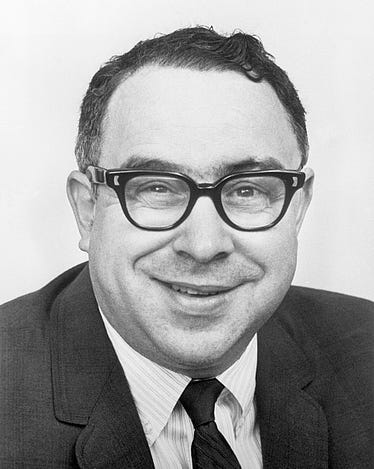|
 |
The Writer's Almanac from Sunday, October 20, 2013
"Immortal Longings" by Robert Pinsky, from The Figured Wheel. © The Noonday Press, 1996.
ORIGINAL TEXT AND AUDIO - 2013
It's the birthday of political humorist Art Buchwald, born in Mount Vernon, New York (1925). In 1982, Buchwald won the Pulitzer Prize for his syndicated column "Art Buchwald," which appeared twice a week in over 550 newspapers. His columns have been published as collections such as I Think I Don't Remember (1987) and Whose Rose Garden Is It Anyway? (1989). Buchwald began writing columns when he lived in Paris in the 1950s. In order to afford to live there, he took a job writing a column for the Paris edition of the New York Herald Tribune called "Paris After Dark" (1949). At first, he wrote about Parisian nightclubs, but then he began to write a humorous column called "Europe's Lighter Side" (1952). One of his best-known satires from his French columns is about a fictional American tourist who tried to win the "six-minute-Louvre race." Buchwald wrote about him racing from the Mona Lisa to the other famous artworks in the museum, making excellent time "under perfect conditions, with a smooth floor, excellent lighting, and no wind."
Buchwald began writing political satire when President Eisenhower made a trip to France. His humorous articles caught the attention of Eisenhower's press secretary, who called the pieces "unadulterated rot." Buchwald answered back, "I have been known to write adulterated rot, but never unadulterated rot." After this, he moved back to the United States and began writing political satire full-time. Buchwald said, "If you attack the establishment long enough and hard enough, they will make you a member of it."
It's the birthday of poet Robert Pinsky, born in Long Branch, New Jersey (1940). He played the saxophone in high school, and he said: "My first experience of art, or the joy in making art, was playing the horn at some high-school dance or bar mitzvah or wedding, looking at a roomful of people moving their bodies around in time to what I was doing [...] The fact that it was my breath making a party out of things was miraculous to me, a physical pleasure." His parents wanted him to be an optician like his father, but he chose to go to college, the first person in his family to do so. At Rutgers, he took a class on poetry his freshman year, and he was amazed by "Sailing to Byzantium" by W.B. Yeats. He said: "It was the speed with which he covered the ground. Wow: 'artifice of eternity'!'' Pinsky typed up "Sailing to Byzantium" and hung it on his dorm room wall, and decided to become a poet himself.
He went on to graduate school at Stanford. When he arrived at Stanford, he thought he was quite talented, so he took a bunch of his poems to the poet and critic Yvor Winters and announced that he hoped he would receive credit just for having written them. Instead, Winters read his poems for three minutes and then said, "Well, there may be some gift here, but it's impossible to tell, because you simply don't know how to write." Pinsky begged to be let into one of the professor's courses, but the prerequisite for all the other classes wasn't being offered that term. Winters took pity on Pinsky and offered to take him on as an independent study, and he became Pinsky's mentor at Stanford. Ten years later, Pinsky published his first book of poems, Sadness and Happiness (1975).
In 1993, a group of 19 poets, including Pinsky, were each asked to translate a section of Dante's Inferno for a reading at the 92nd Street Y in New York City. Pinsky was so excited by the work that he just kept going, and he ended up publishing The Inferno of Dante: A New Translation in 1995 to great acclaim.He said: "I got hooked on the technical challenge [...] It was more like having an absorbing new video game or sewing pattern or boat-building pattern than a large undertaking. It was like trying to master a song, or working on your jump shot or something. It was not consciously a scholarly or even a literary process: more athletic or musical or puzzle solving: working on a wonderful jigsaw puzzle or sudoku."
His books of poetry include The Want Bone (1990), Jersey Rain (2000), and Selected Poems (2011).
He said: "I think that if an audience for any art is having a good time, they are willing to suspend the need for comprehension for a while — that's part of the pleasure. [...] And if it doesn't sound good, it is boring even if we understand it. That's the trouble with a lot of boring art: you understand the stupid cop show, or the tedious sitcom gag, too soon and too completely. Same for the stupid middlebrow poem."
It's the birthday of the man who designed St. Paul's Cathedral in London, architect Christopher Wren, born in East Knoyle, England (1632). In addition to his accomplishments as an architect, he knew Latin, he could draw, he did work in medicine and mechanics, he was a brilliant mathematician and astronomer, and a philosopher, too.
And he had impeccable manners. He particularly disliked swearing. When he was overseeing the construction of St. Paul's, he issued this official order: "Whereas, among laborers, etc., that ungodly custom of swearing is too frequently heard, to the dishonor of God, and contempt of authority; and to the end, therefore, that such impiety may be utterly banished from these works, intended for the service of God, and the honor of religion. It is ordered, that customary swearing shall be a sufficient crime to dismiss any laborer that comes to the call; and the clerk of the works, upon sufficient proof, shall dismiss them accordingly. And if any master, working by task, shall not, upon admonition, reform this profanation among his apprentices, servants, and laborers, it shall be construed his fault; and he shall be liable to be censured by the commissioners."
It's the birthday of the poet Arthur Rimbaud, born in Charleville, France (1854). He wrote all of his poetry in the space of less than five years, from age 15 to 20. His father, an army captain, deserted the family when Rimbaud was six. His mother was a devout Catholic and strict disciplinarian. She hovered over him as he did his homework, and she walked him back and forth to school well into his teenage years. Rimbaud was a gifted and brilliant student. He published his first poem when he was 15, and ran off to Paris, where he spent two weeks living homeless and hungry, roaming the streets.
He sent some of his poems to the poet Paul Verlaine, who was so impressed with the 16-year-old Rimbaud that he sent the boy a one-way ticket to Paris to visit him. The teenage Rimbaud and the married Verlaine soon became lovers, which scandalized the established literary scene in Paris. The two were inseparable for a year or so, and then, in 1872, they got in an argument, and the drunken Verlaine fired a few gunshots, one of which hit Rimbaud in the wrist. The police arrested Verlaine, and Rimbaud was forced to testify. The trial was humiliating, and Rimbaud disappeared from public life. He wrote one more book, called A Season in Hell (1873), and then at the age of 20, his literary career came to a close. He died of cancer in 1891, at the age of 37, and Verlaine published his complete works four years later.
Today is the birthday of Monica Ali, born in Dhaka, Bangladesh, in 1967, to an English mother and a Bangladeshi father. The family moved to Manchester, England, when she was three years old. She dabbled in writing, but felt constricted by the short-story format and tried to work up the courage to tackle a novel. She finally found the push she needed when her grandfather died. "There's something galvanising about a funeral," she told The Observer in 2003. "I felt the need to not put things off any longer. And I sent my husband outside with the little ones, and I drew the curtains against the sun, and I started then." She's the author of four novels; her first, Brick Lane (2003), was short-listed for the Man Booker prize and later made into a film in 2007. She was named one of Granta's "Best of Young British Novelists" before the book was even released, based on a peek at the unpublished manuscript that was making the rounds. Her latest novel is Untold Story (2011).
Be well, do good work, and keep in touch.®
A PRAIRIE HOME COMPANION CHRISTMAS Songs, Stories, Sketches, and our Same Old Sponsors
December 14, 2024
7:30 p.m.
The Fitzgerald Theater, St. Paul, MN
If you are a paid subscriber to The Writer's Almanac with Garrison Keillor, thank you! Your financial support is used to maintain these newsletters, websites, and archive. If you’re not yet a paid subscriber and would like to become one, support can be made through our garrisonkeillor.com store, by check to Prairie Home Productions, P.O. Box 2090, Minneapolis, MN 55402, or by clicking the SUBSCRIBE button. This financial support is not tax deductible.


